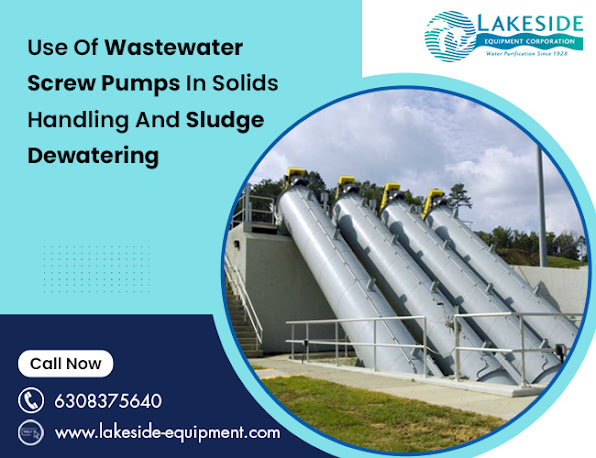Use Of Wastewater Screw Pumps In Solids Handling And Sludge Dewatering
Wastewater screw pumps, sometimes referred to as Archimedes screw pumps are a crucial piece of machinery for handling particles and dewatering sludge at wastewater treatment facilities. These pumps are a dependable and affordable option for handling challenging-to-pump materials since they are made to transfer solids and sludge efficiently with little wear and tear.
Screw pumps are frequently employed in the biological treatment stage of wastewater treatment plants to remove extra particles and sludge from the water. The removal of these solids and sludge, which are produced as a consequence of the microbial decomposition of organic matter in wastewater, is essential to avoid the accumulation of too much biomass in the treatment facility. Excess biomass might affect operations and treatment effectiveness if it is not adequately removed.
Why Are Screw Pumps Used In Wastewater Treatment?
Because of their screw-like design and revolving helix, screw pumps are especially well suited for handling high solids concentrations because they gently transfer particles and sludge through the pump without crushing or grinding them. They are therefore perfect for pumping sludge that is fibrous or contains a lot of grit or sand, which can be challenging for other types of pumps.
Screw pumps are good at handling solids, but they're also good at dewatering sludge. Sludge is dewatered in order to minimize its volume and weight, which makes it simpler to transport and dispose of. This is a crucial phase in the treatment of wastewater because it lessens the amount of sludge that must be transported and processed, which can save money and lessen the treatment plant's impact on the environment.
Wastewater screw pumps come in a number of distinct varieties, each with special characteristics and advantages. A progressive cavity pump is a popular form of screw pump that is made for high-pressure applications and has the ability to handle a variety of solids and sludge concentrations. The peristaltic pump is an additional kind of screw pump that moves sludge through the device using a flexible hose. Since there is no direct contact between the sludge and the pump, this type of pump is frequently employed in circumstances where contamination of the pumped material must be avoided.
In order to preserve the longevity and effectiveness of these pumps, it is crucial to properly maintain and care for them in addition to selecting the best type of screw pump for the particular application. This entails routinely lubricating and cleaning the pump and, when necessary, replacing worn-out or broken components. Maintaining the pump properly can assist to increase its lifespan and decrease the need for expensive repairs or replacements.
The Bottom Line
Although wastewater biological treatment includes other important components such as a sludge screening system, wastewater screw pumps are essential for handling solids and dewatering sludge. These pumps are great for dewatering sludge to lower its volume and weight and are built to carry particles and sludge efficiently with little wear and tear. Wastewater screw pumps come in a variety of designs, and in order to maximize the treatment procedure, it is crucial to select the proper design for the particular application. In order to guarantee the durability and effectiveness of these pumps, proper maintenance and care are also essential.




Comments
Post a Comment